One among the four civilians killed in Shopian on April 1 was returning home after meeting his infant daughter. Another had left home for picnic and yet another was looking forward to inaugurate his soap factory. But as the distinction is fast blurring between combatants and civilians in the strife-stricken region, the “dirty war” is now unleashing new tragedies across the valley.
Three houses and the lifetime income has now become a site of war wreckage. The ruin pattern is familiar: Smoked walls, wasted home appliances, blasted roofs and burnt documents — including the birth and school certificates, notebooks scribed with the arduous winter homework, ration cards, and some lifesaving medical prescriptions.
Everything has been wasted in the “dirty war” where in style of hellfire, the counterinsurgents are now routinely bombing the residences — they denounce as “militant safe houses” — otherwise, sheltering the ill-equipped and least-trained nemesis. To chagrin of the “war-weary” community, the smouldering sites are now throwing up roasted bodies.
Somewhat similar scenes were lately broadcasted from Shopian, where the biggest counterinsurgent strike of the last decade left 12 insurgents (excluding one from Dialgam, Islamabad), three counterinsurgents and four civilians dead.
Much of the damage was done in Kachidora, a bordering village between southern Kashmir’s Shopian and Kulgam.
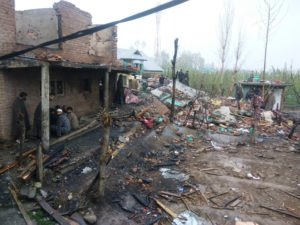
The gun fight site at Kachidoora. (FPK Photo/Aamir Ali Bhat)
As a latest address of the wrecked site in Kashmir, the village is witnessing a ‘solidarity’ footfall at the moment. Standing and greeting the visitors in front of their bombed houses, the three Lone brothers—Abdul Rehman Lone, Ali Mohammad Lone and Zahoor Ahmad Lone—are reflecting a resolve to rebuild their lives all over again.
When a posse of army, cops and paramilitary forces cordoned Kachdoora at around 12:30am in the intervening night of March 31 and April 1, Abdul Rehman Lone was hosting a group of Hizbul Mujahideen insurgents inside his house.
“They were 7 in number,” says Maqbool Lone, Rehman’s brother, standing before the smoked structures that his clan once knew as homes. “All of them performed ablution and went away. Some 15 minutes later, the five among them returned.”
Soon, the first gunshot rang in the village.
“Our families were still inside when the forces began firing indiscriminately at our houses,” says Maqbool, who lives adjacent to Rehman’s house. “We came out of the house at around 3:45 am and my brother’s family left their house early in the morning at around 6:30 am.”
By the stroke of the first light, the forces killed the insurgents by blasting three houses and cowsheds.
“Our 40 sheep and 3 cows were charred alive,” Maqbool continues. “Before leaving, the forces stole our valuable belongings, including 33 cellphones.”
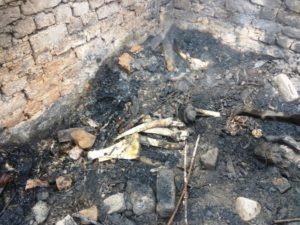
Roasted caracass inside the blasted cowshed. (FPK Photo/Aamir Ali Bhat)
Not far from these smouldering homes, as protesters began engaging with the forces in stone pelting, 19-year-old Zubair Bhat from Gopalpora, Kulgam was having breakfast at his uncle’s place. He was looking forward to inaugurate his soap factory.
After breakfast, he asked Rs 1000 from his grandfather, who instead gave him Rs 2000. “But he only took Rs 1000,” says Abdul Rehman Bhat, terming Zubair his friend than a grandson.
As he stepped out, the protest began intensifying near the gunfight site — sending out anger, besides curls of smoke and raging flames.
Some hours later, his father’s cellphone rang up. The screen showed: Zubair calling… The father thought it as a casual call from his son. But it wasn’t him.
“Someone else was calling from his number,” says Abdul Ahad Bhat, Zubair’s father. He recalls it a panting voice, telling him that his son’s right arm had been shot. Ahad rushed to Kulgam hospital with his fast pounding heart. Struggling with his ‘untoward’ thoughts, he was trying hard to fake normalcy: hoping against the hope. But the moment he spotted his son—lying cold and motionless on a stretcher—he couldn’t contain himself and wailed like a baby.
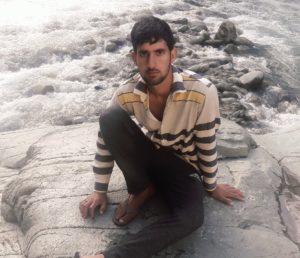
Zubair Ahmad Bhat
Shot on his right chest, Zubair was brought dead to the hospital. And since then, the father keeps wondering about the fate of his slain son’s soap factory.
The villagers say Zubair was killed in a kneejerk action of the forces, often accused for flouting the SOP—Standard Operating Procedure—while dealing with the unarmed dissenters near the encounter sites. The civilian kill count has reportedly increased after the Indian army chief Bipin Rawat decried the “dirty war” in Kashmir during his TV talk and apparently blurred the distinction between guns and stones.
That day, a 28-year-old labourer from Khasipora, Shopian was walking home through paddy fields. He was returning from his in-laws where he had gone to see his daughter. Suddenly some 1.5 kilometres from the encounter spot, Mohammad Iqbal Bhat fell down. He was hit by a bullet on his abdomen. On way to SKIMS, he succumbed.
Iqbal is survived by 17-month-old daughter, Aiza and wife Rohi Jan—with whom, he tied knots after his first wife and their twins died.
“Iqbal Bhai had faced lot of tragedies during last couple of years,” says his youngest brother, Nawaz Bhat. “I was a kid when our parents died. And it was Iqbal Bhai who became my mother and father. By killing him for none of his fault, they’ve made me orphan, again.”
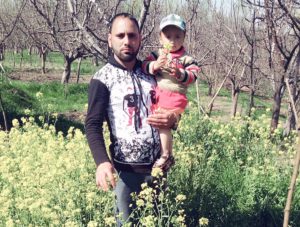
Iqbal Bhat holding his 17-month old baby girl.
That evening, a Kangri-weaver from Kulgam’s Okey village saw his “hope” being handed over to him in the form of a dead body.
That “hope” was his 19-year-old son, Mehraj-Ud-Din Mir. Among Mohammad Yaseen Mir’s two unmarried daughters and a mentally-unsound son, Mehraj, a class 11 student was the potential change-maker.
Early that day, he had left home for picnic at Aharbal. At around 6:30 pm, when the father got a call from his son’s number, his world turned upside down. After getting shot, Mehraj had succumbed on way to Srinagar.
As he hosted his pale and cold son at his house one last time that night, Yaseen wondered: “How will I inform him about the result of his math paper in which he appeared lately?”
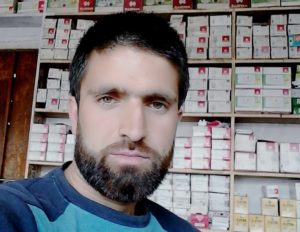
Mehraj-ud-Din Mir
Inside SKIMS hospital, another assaulted boy is now battling for his life. That day, 15-year-old Muneeb Wani had come out to play his routine Sunday cricket match.
“As situation turned tense, we called him,” says his mother Fahmeeda, lamenting inside her single-storey house at Gopalpora, Shopian. “His cousin picked up the phone and said they’ll return soon.”
But as he took time to return, his anxious sister rang him up, again, only to hear him scream, “Hatai Moujai” (Oh, Mother!)
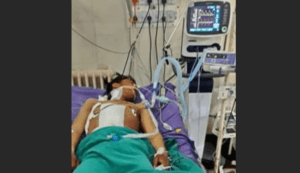
Muneeb Ahmad Wani lying in coma
“These were his last words,” the inconsolable mother recalls. “I realised then and there only that he has been shot.”
The mother’s intuition was correct. A bullet after piercing her son’s belly had damaged his liver. Since then, Muneeb is in coma. His condition remains critical despite being operated twice.
The troubled mother now worries about the fate of her son, who she says, was only holding a bat when shot by forces. Perhaps the case in point makes it certain, that the distinction is fast blurring in the “dirty war”.
Like this story? Producing quality journalism costs. Make a Donation & help keep our work going.








